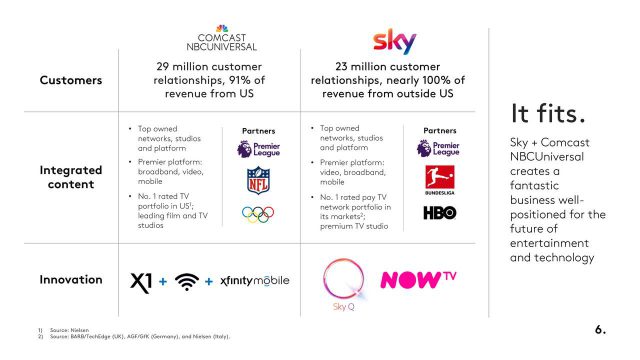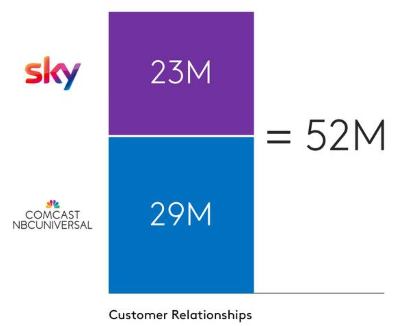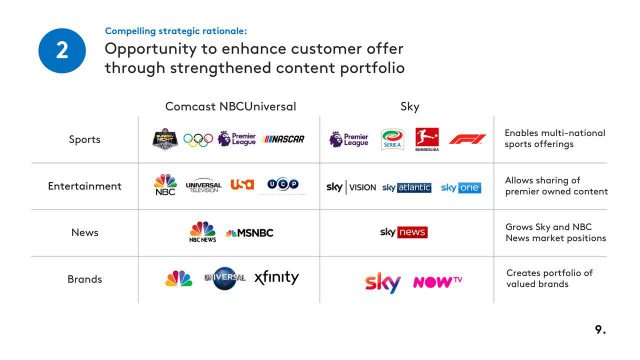Comcast Corporation today made a surprise $31 billion bid to acquire Sky, the British-based satellite TV, internet, and wireless provider, disrupting a rival bid from 21st Century Fox, which spent years trying to acquire the 61% of Sky it doesn’t already own.
Comcast’s bid of £12.50 a share to acquire Sky outright is significantly higher than the £10.75/share offer Fox made to take total control of the satellite venture. A third player – Disney, has been in talks with Fox to acquire a substantial number of its assets, including its minority ownership stake in Sky, for $52 billion. But Comcast’s bid may change everything.

 That three American companies are now competing to acquire Europe’s largest media company and biggest pay-TV broadcaster, with more than 23 million subscribers, could create concern among some regulators about foreign ownership of the media. A bid from Comcast is likely to be less controversial than dealing with Rupert Murdoch, however, who already has extensive media holdings in the United Kingdom.
That three American companies are now competing to acquire Europe’s largest media company and biggest pay-TV broadcaster, with more than 23 million subscribers, could create concern among some regulators about foreign ownership of the media. A bid from Comcast is likely to be less controversial than dealing with Rupert Murdoch, however, who already has extensive media holdings in the United Kingdom.
There are three distinct possible bidders for Sky now:
- Comcast, which prefers to take 100% ownership but will accept a majority stake shared with Fox (or possibly Disney).
- Disney wants minority stake in Sky through its $52+ billion acquisition of some of Fox’s assets, including Fox’s part-ownership in Sky.
- Fox, which has sought to take full control of Sky for several years but has met with resistance was originally the most likely buyer. But more recently, Rupert Murdoch has recently shown a willingness to sell some of Fox’s assets, including Sky, if the price is right.
Sky’s share price leaped more than 20% today to £13.47—well above the Comcast offer—as investors believe there will be a bidding war over Sky. Because many hedge funds and investors expect Fox will increase its bid to match Comcast, in turn boosting the value of Sky’s stock, investors are accumulating shares at a rapid pace and driving up share prices further.
Sky has become increasingly valuable because it isn’t just a satellite TV provider. Sky also develops its own original productions, has valuable sports rights deals, and sells broadband and mobile phone service. American media companies are consolidating, preferring to own both the pipes that deliver internet content and the content itself. Acquiring Sky would allow Fox, Disney, and/or Comcast to showcase its own productions in Europe and to a lesser extent import Sky products into the United States.
Regulators in the United Kingdom are likely to press any buyer to protect the independence of Sky News, a well-regarded 24-hour news channel. Many expect regulators to insist that Sky’s buyer agree to fund Sky for at least 10 years and guarantee its editorial independence.



 Subscribe
Subscribe Despite
Despite 
 Time Warner Cable customers hoping for improved service from new owner Charter Communications also appear to be out of luck. As Charter has grown in size, its already-mediocre customer satisfaction rating is apparently slipping again, now making it to 24/7 Wall Street’s Worst list at #12.
Time Warner Cable customers hoping for improved service from new owner Charter Communications also appear to be out of luck. As Charter has grown in size, its already-mediocre customer satisfaction rating is apparently slipping again, now making it to 24/7 Wall Street’s Worst list at #12. Washington State Attorney General Bob Ferguson
Washington State Attorney General Bob Ferguson 
 Comcast allegedly facilitated the service call charges until approximately June 2015 by encouraging technicians to use a service call “fix code” that permitted Comcast to “add service charges to a normally not charged fix code.” That allowed technicians to properly track Comcast’s own network troubles yet still charge customers to roll a truck to their home, even when the service call should have been free.
Comcast allegedly facilitated the service call charges until approximately June 2015 by encouraging technicians to use a service call “fix code” that permitted Comcast to “add service charges to a normally not charged fix code.” That allowed technicians to properly track Comcast’s own network troubles yet still charge customers to roll a truck to their home, even when the service call should have been free. A Washington state man who just moved into his new home is now being forced to consider selling it to somebody else because Comcast repeatedly misled him about its ability to provide service.
A Washington state man who just moved into his new home is now being forced to consider selling it to somebody else because Comcast repeatedly misled him about its ability to provide service. Four of his options were wireless carriers that don’t provide a strong signal to his home or charge obscenely high prices for usage capped Internet access. ViaSat was on the list promising up to 25Mbps, but ViaSat satellite customers can testify the actual speeds received are much slower, and do not reliably support the VPN access Seth required.
Four of his options were wireless carriers that don’t provide a strong signal to his home or charge obscenely high prices for usage capped Internet access. ViaSat was on the list promising up to 25Mbps, but ViaSat satellite customers can testify the actual speeds received are much slower, and do not reliably support the VPN access Seth required.